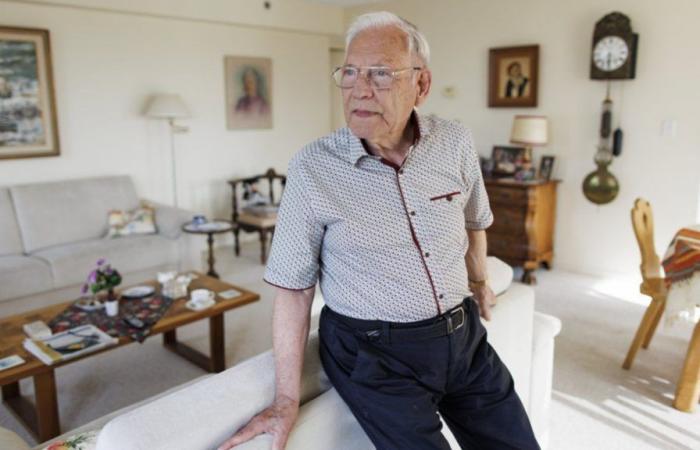At the beginning of the new millennium, Mr. Ubbens and his wife decided to begin a new phase in their lives.
“My wife said to me, ‘It’s over. I want you to sell your business.'”
So he sold his 45-year-old insurance company to officially enter his golden years with his wife.
Twenty-four years later, now a widower, Mr. Ubbens says he has managed to live comfortably and still has enough money to last until his 110th birthday. He attributes this success to his frugal lifestyle and hard work.
“I don’t waste money,” he said.
“People say to me, ‘Why don’t you buy a new car? You have a 2010 Ford,'” Ubbens said. “But you know, the fact is I’m old. So we have to grow old together.”
Historically, retirement has lasted about 20 years, but for some Canadians it now extends to twice that length as more and more Canadians live into their 90s and beyond. This has led some to rethink their investments, savings, spending and timing of retirement in order to stretch their retirement funds further than ever before.
Life expectancy of Canadians improves
Statistics Canada has released new projections indicating that the number of Canadians over the age of 85 could more than triple by 2073, while the number of centenarians could increase nearly tenfold, to more than 106,000.
Kurt Rosentreter, a certified financial planner at Manulife Wealth, says you need to think about the time horizon, how much money you need and whether that money will last. The main question is when to retire.
“It’s an important factor in planning,” he said. “If someone retires at 55, they could literally live half a century without any new money coming in, in a society where the cost of living is increasing every day.”
Soaring inflation and interest rates have derailed many household budgets in recent years, including those of retirees on fixed incomes. A 2023 study by the National Institute on Aging shows that the top concern for Canadians aged 50 and older is inflation, followed by the fear of running out of money in their old age.
Surprised by a longer life than expected
Hank Kuntz, 92, never expected to live this long and rarely thought about his retirement savings.
“My father, I think, was the oldest of his generation, and he was 87 and a half when he died,” he says. When Mr. Kuntz was in his 20s, he remembers thinking, “Oh my! 65! I’ll be an old man already.”
Kuntz added that 65 was “the normal retirement age” when he stopped working as an accountant in 1997. He began to enjoy his life after work, filling his time with volunteer work at a disability organization. But he didn’t necessarily expect to be looking at his finances more than 25 years later.
“I didn’t plan much,” he admits.
He has a regular income from the Canada Pension Plan, Old Age Security and registered retirement savings. He lives in a retirement home and, if some of his savings run out, Kuntz says he could continue to live comfortably with other income from investments he started nearly 50 years ago.
Running out of money is far from a theoretical concern. At age 71, a person’s RRSP account matures and the cash must be withdrawn, placed in an annuity or transferred to a registered retirement income fund (RRIF), where minimum withdrawals increase with the account holder’s age.
At age 95 and over, the minimum annual withdrawal is 20% of the fund’s assets.
“The formulas that (the Canada Revenue Agency) uses are really outdated,” said Bonnie-Jeanne MacDonald, director of financial security research at the National Institute on Aging. “Because of the way the system is set up, people will have to be forced to deplete their RRSPs” before they turn 100.
She says policies need to change to accommodate the explosion in the number of centenarians. Statistics Canada estimates that the number of centenarians has tripled in the last two decades. In 2003, there were 3,854 centenarians, compared to 11,705 last year.
Wayne Westman, a licensed financial advisor, has worked with at least three generations of clients over his 60-year career. His oldest clients were in their mid- to late 80s, only slightly older than Wayne Westman, who is now 84. Today, his clients include a 103-year-old and others who are on the verge of reaching centenarian status.
Many of his clients in their 80s and 90s are in a decent financial position because they have defined-benefit pension plans from their employer or their spouse’s employer, which aren’t as common for today’s workers. Those plans, combined with federal pensions and personal investments, have kept many seniors afloat, Westman says.
Nevertheless, it is necessary to establish a prudent budget.
Angeline Charlebois, 105, has lived alone in her Levack, Ont., home for 29 years. She says income from her late husband’s pension and Old Age Security helped her through her retirement years. It helps pay for a roof over her head, utilities and groceries.
“I have enough money for now,” Charlebois said. But if she had to move into a retirement home, she doesn’t think she would have enough money.
“A nursing home will cost between $3,000 and $3,500 a month,” Charlebois said. “My checkbook is not big enough to support that.”
But Mrs. Charlebois feels like a millionaire as long as she is healthy and can stay at home.
“I am very lucky to have my health and my ecology»she said, referring to the study of the soul or spirit, and pointing to her head.
As she watched Charlebois age, her daughter reimagined her own life as a future centenarian. Clairice Poirier, 70, retired three years ago. A widow for 25 years, she says she has always been good about her finances, but never factored in longevity and inflation when planning for her retirement.
“I never imagined that the cost of living would go up the way it has,” she says. “Yet your pensions don’t go up accordingly – some do, but not all.”
But Poirier is not worried about running out of money in her old age if she lives as long as her mother, or if she will need a care facility when she is older.
“I don’t worry about it because I’m a money-saver,” she said. “I’ll make sure it runs its course.”
Rosentreter, a financial planner, said pensions combined with registered retirement savings, tax-free savings and even investments may not be enough to meet health care costs and modern life in Canada.
He suggested establishing other sources of income for the elderly, such as renting out property.
For his part, Mr. Ubbens has lived for more than a decade in a retirement building in Brampton, Ont., where he is well established – financially and otherwise. But he does not rely solely on his registered retirement funds, his federal pension and his savings.
His creative plan to keep the money flowing until he turns 100 is to lend it to his family.
“I gave three of my grandchildren a mortgage on their house at a low interest rate,” says Ubbens. “They pay me monthly payments until the mortgage is paid off, and I have invested some of that money.”
He added: “I can probably live to be 108 or 110. I don’t have to worry about my finances.”
Working beyond the age of 65 also helps to secure the future and to build up pension and savings funds, depending on each person’s level of spending.
Still, it can be difficult to plan for retirement, not knowing whether it will last 20 or 40 years. Rosentreter said he advises his clients to use age 100 as a benchmark, even though the average life expectancy in Canada is 79 for men and 84 for women, according to Statistics Canada.
“Most people stick to that. They know they’ll die before then, but they understand they have to make sure they have enough money.”
Mr. MacDonald of the National Institute on Aging says that deciding how much to save for retirement is based on the likelihood of living beyond a certain age and asking “what if.”
Start thinking: “If I know there is a 50% chance that I will live past 90, what would happen? If I were widowed, what would happen?”
“There’s a very good chance you’ll live a long time,” MacDonald said. “For most Canadians, that’s true.”
Using the CPP or its Quebec equivalent, the Quebec Pension Plan, during the later years of retirement can help seniors grow their money, since the monthly benefit increases with the age at which a person begins collecting the money.
“While most people can afford to wait,” said MacDonald, “an overwhelming majority (nine in 10) choose to collect their CPP/QPP benefits before age 65, reducing the lifetime income security they say they want and will most likely need.”
She suggested delaying the payment of these benefits as long as possible after retirement and filling the gap with savings such as RRSPs.
“By doing this, I’m going to increase this pension for life, which protects me from inflation, which protects me from the risk of running out of money, which protects me from investment risk.”






